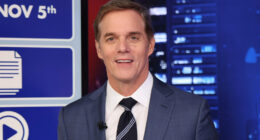The nation’s most powerful banker on a seven-figure salary says she understands Aussies are doing it tough – with new figures showing mortgage holders are the ones suffering most from the cost-of-living crisis.
Reserve Bank Governor Michele Bullock on Tuesday declared a rate cut was unlikely during the next six months.
‘I understand that this is not what people want to hear,’ she told reporters in Sydney.
But the woman in her early sixties earning $1.090million with super, who has been a Reserve Bank employee since 1985, declared she understood people were struggling financially as a result of her rate rises.
She saw her remuneration climb from $817,800 in September last year when she was promoted from the post of deputy governor to become the first woman to lead the RBA.
She was around the board table, as either governor or deputy governor, when the RBA raised rates 13 times in 2022 and 2023.
This has led to a 68 per cent surge in monthly mortgage repayments, which means someone paying off an average $600,000 loan is paying $18,744 more a year.
‘I know there are many households and small businesses that are struggling with interest rates where they are – many people are doing it tough and we’re very conscious of that,’ she said.

Reserve Bank Governor Michele Bullock on Tuesday declared a rate cut was unlikely during the next six months
‘We can’t let inflation get away – it hurts everyone; it particularly hurts people on lower incomes, this is why we need to stay the course on bringing down inflation.’
Boomers of her generation are the ones suffering the least from the cost-of-living crisis with new Australian Bureau of Statistics data showing the living costs of those on the age pension rose by 3.7 per cent in the year to June.
This was below the overall 3.8 per cent headline inflation rate, with the generation born between 1946 and 1964 able to access superannuation and more likely to be retirees.
By comparison, employee living costs surged by 6.2 per cent as the younger generation battle soaring mortgage repayments or rents.
This means the older generation battling smaller living costs are continuing to spend as younger home borrowers and renters cut back on spending, only for inflation to remain high.
Relief from the most aggressive rate hikes in a generation is unlikely by Christmas with the Reserve Bank declaring inflation is still too high, as it left the cash rate on hold at a 12-year high of 4.35 per cent.
‘Given what we know at the moment, the near-term interest rate cuts are not on the agenda,’ Ms Bullock said.
But Ms Bullock admitted there were dangers of unemployment climbing too high if rates stayed higher for longer.
‘We’re worried that if certain things transpire and the economy slows more quickly, more people lose their jobs – that’s not great for people either,’ she said.
The Reserve Bank also released new forecasts on Tuesday showing headline inflation, also known as the consumer price index, won’t fall within its 2 to 3 per cent target until December 2026 – a year later than previously forecast.
Another rate rise isn’t being ruled out.
‘Data have reinforced the need to remain vigilant to upside risks to inflation and the board is not ruling anything in or out,’ the RBA statement said.
‘Policy will need to be sufficiently restrictive until the board is confident that inflation is moving sustainably towards the target range.’
Westpac chief economist Luci Ellis, a former assistant governor at the Reserve Bank, said the bank would now have to reassess its forecast of a November rate cut.
‘Given the Board apparently does not see its way to cutting rates this year, our expectation of a November rate cut is unlikely to be achieved,’ she said.
The Reserve Bank, under Ms Bullock and her predecessor Philip Lowe, has embarked on the most aggressive interest rate rises since the late 1980s, back when boomer borrowers were paying 18 per cent interest rates but on houses that were much cheaper compared with incomes.

But the woman earning $1.090million, with super, who has been a Reserve Bank employee since 1985 declared she understood what it was like to struggle financially (pictured is Brisbane’s Queen Street Mall)
But this aggressive approach to monetary policy tightening led to a recession in 1991.
AMP chief economist Shane Oliver fears the Reserve Bank could repeat the mistakes of 35 years ago and be forced to cut rates before February 2025.
‘There is a rising risk that rate cuts will come sooner if share markets continue to fall sharply and economic data increasingly warns of a high risk of recession,’ he said.
‘In terms of what the RBA should do as opposed to what we think it will do, given the US experience it should now be starting to give consideration to a cut in interest rates as it now risks much higher unemployment and inflation falling below target.’






